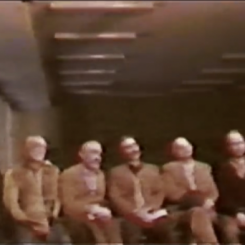Source: www.lrb.co.uk
By Saleem Vaillancourt

Forty years ago the Islamic Republic of Iran admitted that it had executed my great-uncle. He was 65 years old. Mehdi Amin-Amin was survived by his wife, daughter, two grandsons and three siblings, including my grandmother. If I’d known him, I would have called him Mehdai-joon, a contraction of Mehdi and the Persian words dai (‘maternal uncle’) and joon (‘dear’).
He was arrested and killed because he was a Baha’i: a member of Iran’s largest non-Muslim religious minority. More than two hundred were executed after the 1979 Islamic Revolution. Today Baha’is suffer discrimination in every part of their lives.
As Le Monde reported, the authorities at first denied the killings. But on 20 January 1982, in a Tehran newspaper, two judiciary officials, Ayatollah Mohammadi Gilani and Seyyed Asadullah Lajevardi, said that my great-uncle and thirteen other ‘heads of the perverse Baha’i sect’ had been executed on 27 December for crimes such as insulting Islam, plundering assets and spying on Iran.
He had been arrested two weeks earlier with seven other members of the Baha’i community’s elected national council. Farideh Samimi, a Baha’i woman who was arrested alongside the council members but then released, later said that Mehdai-joon, a lawyer, had asked the Revolutionary Guards if they had arrest warrants. But they ‘didn’t need any warrants. Whatever they said would go.’
The council had decided to meet to discuss widespread attacks against Baha’is during the Revolution. Fereydun Vahman, in his 2019 book 175 Years of Persecution, records that one couple were ‘drenched in kerosene and set on fire’, ‘Baha’i girls were kidnapped and forced to marry’ against their wishes, ‘cemeteries were desecrated’ and corpses ‘dragged out and jubilantly burnt on garbage heaps’. Families of detained Baha’is who went in search of their missing loved ones were sometimes made to pay for the bullets used in their executions.
The members of dozens of local Baha’i councils were arrested and killed. One of them, Khosrow Mohandesi, executed by a firing squad on 4 January 1982 along with five colleagues, was also related to my family. My links to these stories are not unusual: Baha’is with Iranian backgrounds are all within touching distance of the lost.
Ayatollah Ruhollah Khomeini, the Revolution’s leader, said many times that Baha’is were ‘infidels’, ‘unclean’ and not a religious community but agents working for foreign powers. As the historian Abbas Milani points out, however, in Maziar Bahari’s 2014 documentary To Light a Candle, if the authorities had a ‘shred of evidence’ they would have ‘shown it to the world’. They have not.
The mass executions ended in the 1980s, but United Nations reports show that Baha’is in Iran continue to be persecuted. They are monitored and suppressed, denied university educations, their businesses are confiscated, their lands appropriated and official hate speech about them appears in the media. Ayatollah Ali Khamenei, Iran’s supreme leader, signed a memorandum in 1991 calling for these policies.
More than a thousand Baha’is who have faced trial are now awaiting either new hearings or a summons to prison. This purgatory can last months or even years. Having to wait for a jail sentence doesn’t make headlines, but it is a form of torture.
The widow of one of the national council members killed in December 1981, Parvin Roshani, said in a BBC documentary in 2015 that the condemned walked to the execution platform in a line. Mehdai-joon was at the front. When they embraced each other to say goodbye, ‘the firing squad didn’t understand what they were doing, and they opened fire, killing them all before they even reached the platform.’
Leave a Reply